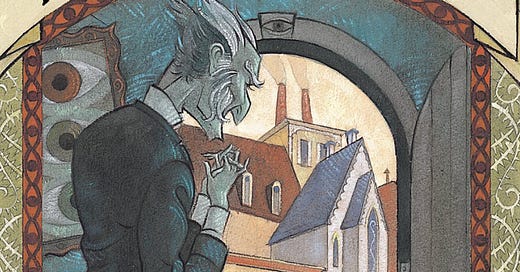A couple of months ago my kids and I watched “A Series of Unfortunate Events” on Netflix. In the second to last episode Count Olaf—the undeniable villain of the series—is on trial and is being accused of doing evil things. In response, he lists through various characters we've seen throughout the series and says something like (I’m paraphrasing from memory):
"I've at least always been honest about my evil desires. That's more than could be said for these ‘good’ people. Over there is a banker who cared more about a promotion than three orphans, a woman who values paperwork over people's lives, a wealthy man who was too afraid to protect you, a vice principal who was more than happy to let me into his school as long as I stroked his ego, and a judge so focused on the letter of the law that she let me marry a 12 year old girl."
I was reminded of this scene yesterday after I read this article from The Pillar about Sr. Danielle Victoria Lussier, Sr. Theresa Aletheia Noble, and an anonymous sister:
This story is important for us, the Body of Christ, to really listen to. First of all, their story is important because the sisters are important, infinitely valuable human persons and our sisters in Christ. In addition to that, it’s important because it touches on so many key experiences of those who been harmed by the abuse of power within the Church. I want to highlight one of them here.
It would be easy to focus on the abusive behavior of the villain in this story, Fr. Nicgorski, because his actions were truly evil. But I’d like to invite you to notice the ways the “good guys” responded:
The religious superiors failed to protect the women under their care by allowing Fr. Nicgorski to continue seeing sisters for spiritual direction after a sister reported that he sexually assaulted her.
When those superiors first spoke to the community about the priest, they continued to protect him by reframing his sexual assault of a sister as merely falling in love and leaning in for a kiss.
Then, when it was finally announced that Fr. Nicgorski had credible accusations against him, several sisters continued to defend him as “a good man” and bemoaned how priests are being persecuted.
Members of the community continued to defend their beloved spiritual director, directing their anger at their own sisters who reported him because “he was so important to them” and “the community had to protect its good name.”
When Fr. Nicgorski was reported to the Vatican Dicastery for Institutes of Consecrated Life, it took Rome two years to respond.
When the dicastery’s secretary, Archbishop Carballo, did finally respond, he said it was “impossible” for the Vatican to do anything about this predator priest.
From the article:
But Carballo said there was little he could do about their allegations.
The archbishop noted that Nicgorski had made a “respectable defense” of himself, “characterized by a credibility similar to that which characterizes your … reports.”
“Although there is no reason to doubt the sincerity of what you have stated, at the same time it must be considered that there is a total lack of witnesses and/or circumstances which, even indirectly, confirm or contribute to confirm your statements, and thereby do not attribute objective certainty to your accusations.”
“Therefore, in consideration only of your statements, you will well understand why it is not possible to reach a certain reconstruction of what happened, nor to a clear and equally certain definition of the eventual responsibilities of Fr. Nicgorski.”
In other words, the Vatican told the sisters that the matter was a “he said - she said,” and its hands were tied.
“It is significantly impossible to reach a decision in this case,” Carballo wrote.
I’m pointing out the ways the good guys responded because that is perhaps most likely were you are called to have courage and be an agent of justice and healing.
We aren’t bishops, religious superiors, or members of Vatican dicasteries. We aren’t prosecutors going after predator priests. But we are parishioners, friends, and siblings in Christ to people who have been harmed by the abuse of power within the Church.
You don’t have to defend the charismatic priest or the beloved pastor. You don’t need to stand up for the bishop who felt like his hands were tied, preventing him from being able to do the right thing. You can believe people when they tell you they’ve been harmed, abused, lied about, and ignored by Church leaders. Only when we act with courage in those situations will this structure of sin in the Church begin to be dismantled.
Structures of sin and abuse of power are allowed to continue when we focus on the isolated bad guys, the obvious villains, and ignore our own subtle complacency in systemic injustice. Someone too afraid to take any personal risk in order to do what is right is supporting the structural sin as much as the villain.
Prioritize the vulnerable instead of the powerful.
Believe survivors.






Excellent article. Thanks, Paul. Those poor sisters.
This is such a systemic problem. My child was bullied at her Catholic middle school and the lack of accountability, the abysmal leadership - we begged the principal, the priest,, the diocesan superintendent - no one stepped in and took responsibility for keeping my child safe. - was very traumatic for us. What could we do? We had to leave the school and later the parish, and help rebuild our daughter and our social community. But that toxic environment remains.
God bless the sisters for rebuilding something beautiful out of their experiences and sufferings and injustices- I pray their new community will bring much healing to them and others. But Lord, I pray justice will be done in our Church! So. Many. Victims.